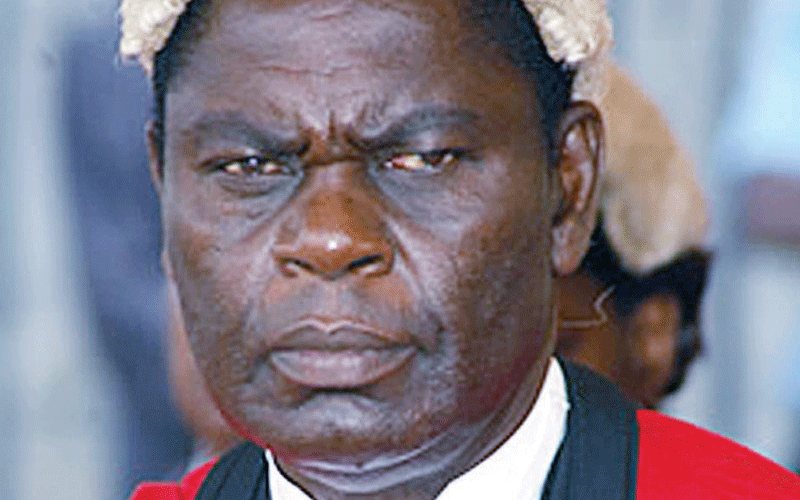Former top judge blows lid off Moi regime dirty Bench antics

Retired Court of Appeal Judge Samuel Onderi Elkana Bosire has opened the lid on how the late President Daniel arap Moi used Pthe rovincial Commissioners to intimidate, harass and force judges to make rulings in favour of the Kanu regime.
In a rare disclosure by a top ranking former judicial officer, Bosire disclosed that during the Moi regime, he received orders from the former President to make rulings, which were in favour of the system or people close to the former Head of State.
He said the provincial commissioners were powerful people in the Kanu government and their word was authority by itself.
Bosire who spoke at a function presided over by outgoing Chief Justice David Maraga on Monday, said that while serving as a judge, he was frequently threatened, harassed and intimidated because he could not accept to give judgments in favour of powerful people in the Moi government.
He cited an incident in Mombasa where he was serving as a presiding judge when a provincial commissioner called and ordered him to make a judgment in favour of the government, a directive he bluntly declined.
Bold and independent
“The commissioner said the instructions had come from the Head of State. I told the PC to go to hell because as judges, we don’t work the way he had assumed,” Bosire said.
“The commissioner immediately reported me to my boss; then Chief Justice Cecil Miller Snr who also questioned why I was going against the presidential directive,” Bosire told the gathering, urging judges to be bold and independent and make decisions devoid of influence from the Executive.
Bosire made the remarks during the opening of Manga Law Courts in Nyamira county; a ceremony which was graced by Maraga and a host of judges and magistrates.
He challenged the Bench to resist any intimidation by the Executive even after Maraga’s retirement.
The CJ is set to proceed on terminal leave today ahead of his retirement in January.
“If you expect to work so that you can be given credit by a human being and you realise that it is not forthcoming, you may end up engaging in crime because you will be forced to bend the law,” he warned.
He advised court officials that history would judge them harshly, if they do not discharge their duties according to the law.
“Work, knowing that you are serving God and He is the only one who can protect you,” he advised the Judiciary officers.
Bosire, a staunch Seventh Day Adventist, said that his integrity was several times challenged but he managed to overcome the temptatations, because he believes in God who he said is his shield and defender.
During Moi’s regime, the Judiciary was heavily criticised for lack of independence largely blamed on a constitutional arrangement that mandated the President to appoint judges-including the CJ.
SM Otieno case
The major accusation was that service was at the whim of the President and judges were forced to bend judgements in favour of the Executive.
The 2010 Constitution, however attempted to cure the matter by ensuring that judges are appointed by the Judicial Service Commission (JSC); the Judiciary top organ that is singularly mandated to oversight the institution.
Bosire who was among judges interviewed for the post of CJ to succeed Evan Gicheru, left the Judiciary following the 2012 purge by the Justice Ringera-led commission.
The commission ruled that he was not fit to serve as a judge, accusing him of among other things, condoning the torture in 1982 of suspects accused of attempted coup.
The judge, who is remembered for chairing the Goldenberg Commission of Inquiry was among other things accused of being harsh to a widow in a burial dispute.
This was in reference to the much-quoted lawyer SM Otieno burial case in which Bosire ruled against the demand by the widow.
Justice Bosire was accused of appearing to favour the Umira Kager clan in the dispute over the burial site of the lawyer, pitting the clan against his widow,Wambui.
Wambui wanted Otieno buried in Upper Matasia (Ngong) but the judge ruled in favour of the clan, which wanted the lawyer interred at his Nyalgunga village home in Siaya.
Bosire has consistently defended himself that the decision was made using customary law.
“Burials are sensitive especially among the Luo. The matter had to be dealt with and a decision had to be made on the basis of customary law,” he told members of the JSC during an interview in 2010.
He was also accused of ignoring orders issued by then High Court Judge Joseph Nyamu in 2006, to have 10 prominent personalities summoned to testify before the Golden Commission of Inquiry.











